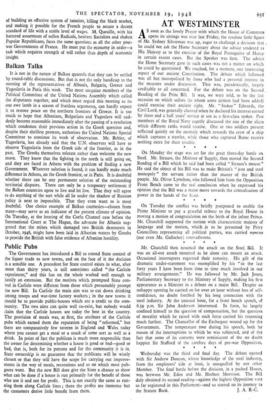Public Pubs
The Government has introduced a Bill to extend State control of the liquor trade to new towns, and on the face of it the decision is a sensible one. A precedent for State control exists in what, after more than thirty years, is still sometimes called " the Carlisle experiment," 'and this has on the whole worked well enough to justify an extension. But the motives which prompted State con- trol in Carlisle were different from those which presumably prompt the new Bill. In Carlisle the main aim was to cut down drinking among troops and war-time factory workers ; in the new towns it should be to provide public-houses which are a credit to the com- munity. The two aims can quite well co-exist, but nobody would claim that the Carlisle houses are today the best in the country. The provision of meals was, at first, the attribute of the Carlisle pubs which earned them the reputation of being "reformed," but there are comparatively few taverns in England and Wales today where you cannot get a meal or a snack of some sort as well as a drink. In point of fact the publican is much more responsible than the owner for determining whether a house is good or bad—good or bad, that is, both for its patrons and for the community it is in. State ownership is no guarantee that the publicans will be wisely chosen or that they will have the scope for carrying out improve- ments in the way of meals, recreations and so on which most pub- goers want. But the new Bill does give the State a chance to show what can be done if a house is run primarily for the benefit of those who use it and not for profit. This is not exactly the same as run- ning them along Carlisle lines ; there the profits are immense but the customers derive little benefit from them.


































 Previous page
Previous page